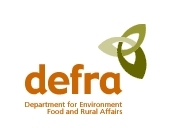UK Department for Environment, Food and Rural Affairs
The Department for Environment, Food and Rural Affairs (Defra) is the government department responsible for environmental protection, food production (Food) and standards, agriculture, fisheries (Fisheries) and rural communities in the United Kingdom (UK). Formal agreements[1] also establish the frameworks for co-operation between Defra and the Scottish Government,[2] the Cabinet of the National Assembly for Wales[3] and with representatives from the Northern Ireland Assembly,[4] which have delegated responsibilities for these matters in their respective nations.
Defra also represents the UK at the European Union on agricultural, fisheries and environment matters and in other international negotiations on sustainable development andclimate change, although a new Department of Energy and Climate Change was created in 2008 to take over this responsibility.
The headquarters of Defra are located at Nobel House in Smith Square, London, England.
Contents
History
Defra was formed in June 2001 when the Ministry of Agriculture, Fisheries and Food (MAFF) was merged with part of the Department of Environment, Transport and the Regions (DETR) and with a small part of the Home Office. The department was created after the perceived failure of MAFF to deal adequately with the 2001 outbreak of Foot and Mouth disease.
The Department had about 10,479 personnel as of January 2009.[5]
In October 2008, the climate team at Defra was merged with the energy team from the Department for Business Enterprise and Regulatory Reform (BERR) to create the Department of Energy and Climate Change.[6]
Responsibilities
Defra is responsible for the UK Government's policy in the following areas:[7]
Aim and strategic priorities
Defra's primary aim is sustainable development, which is defined as "development that enables all people throughout the world to satisfy their basic needs and enjoy a better quality of life without compromising the quality of life of future generations."
Under this primary aim, Defra has five strategic priorities:[8]
- Climate change and energy.
- Sustainable consumption and production, including responsibility for the National Waste Strategy.
- Protecting the countryside and natural resource protection.
- Sustainable rural communities.
- A sustainable farming and food sector including animal health and welfare.
Organization
The Secretary of State for Environment, Food and Rural Affairs, with the assistance of the Minister of State for Food, Farming and Environment, has the overall leadership responsibility for all aspects of Defra.[9]
The day-to-day executive management of the department is provided by:
The Permanent Secretary: Responsible for the overall organization, management and staffing of the department as well as for all financial and other procedures. Also chairs a Supervisory Board comprised of:[10]
- Director General: Policy Delivery
- Director General: Strategy, Evidence and Customers
- Director General: Chief Operating Officer
- Director General: Finance Director
- Chief Scientific Advisor: Provides ministers with the best possible scientific advice. Assures that science and technology are used to inform policy. Also supports the UK Government’s scientific work on minimising the effects of climate change and improving sustainability by promoting consistency across Defra and working ogether with other government departments.[11] Assisted by a Science Advisory Council (SAC) consisting of a chairperson and seven members, all of whom are professors in various UK unversities.
Executive agencies
The executive agencies within the Defra are:[7]
- Animal Health and Veterinary Laboratories Agency
- Centre for Environment, Fisheries and Aquaculture Science
- Food and Environment Research Agency
- Rural Payments Agency
- Veterinary Medicines Directorate
Key delivery partners
Delivery partners are entities that help Defra deliver their services. Defra's key delivery partners are:[12]
- British Waterways
- Covent Garden Market Authority
- Environment Agency
- Forestry Commission
- Natural England
- Marine Management Organisation
- Sea Fish Authority
References
- Note: The formal agreements are referred to as "Concordats".
- Main Concordat between the Ministry of Agriculture, Fisheries and Food (MAFF) and the Scottish Executive.
- Concordat between MAFF and the Cabinet of the National Assembly for Wales.
- Specific Concordat between MAFF and the Scottish Executive on fisheries.
- Defra Departmental Report 2009. (see Table 6 on page 228).
- Marrying energy demand and supply. BBC News, October 3, 2008.
- List of Ministerial Responsibilities, July 2010. (see pages 28-39).
- Delivering the Essentials of Life, Defra’s Five Year Strategy. (see Annex B).
- Defra's Ministers.
- Defra's Supervisory Board.
- Defra's Chief Scientific Advisor.
- Defra's Delivery partners and research centres.

